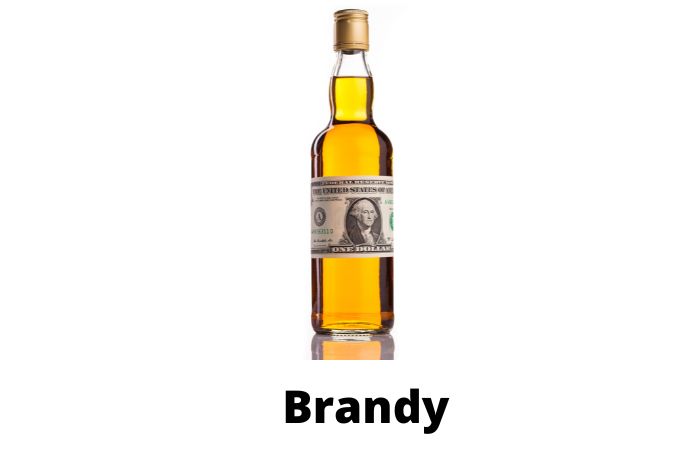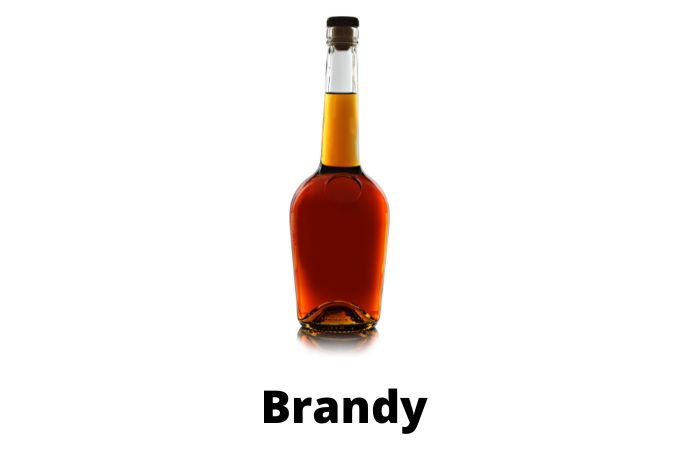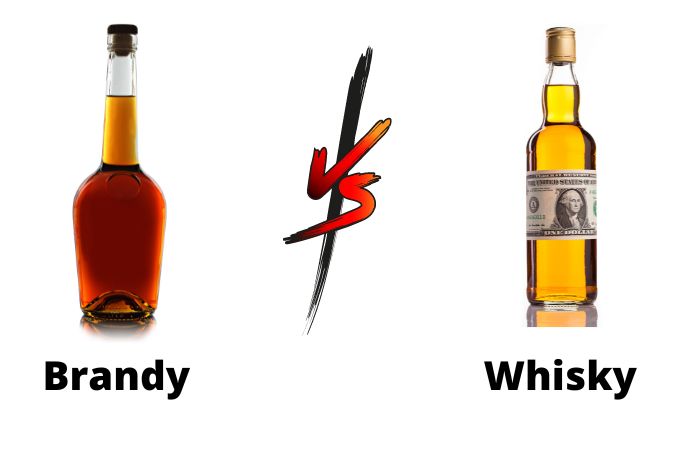Brandy Vs. Whisky: What’s The Difference
Both Brandy and Whisky are distilled spirits aged in wood barrels, but they are not the same. Whisky is prepared using black cereal grains to give it a “heavier” flavor, whereas Brandy is made with fermented wine or fruit to give it a smoother texture and a delicate, sweet flavor.
In this post, we will talk about two of the most famous liquor, Brandy and Whisky. You will find all their similarities and differences mentioned below.
About Brandy
The name “Brandy” derives from the Dutch word “branwjin,” which means “burnt wine” and refers to the process of distillation.
Grape Brandy is the most popular type of Brandy today. It is manufactured by distilling a fermented grape mash or a grape-based wine. The filtered liquid is then matured in oak barrels for at least two years.
One of the most famous brandies is Cognac. It is a grape Brandy produced in France’s Cognac area. The manufacture of Cognac is governed by tight guidelines, including a requirement that it include at least 90% Ugni Blanc, Folle Blanche, or Colombard grapes.
About Whisky

Whisky is a fermented grain mash that is distilled into a spirit. The grains in the mash might vary depending on Whisky’s style, although malted barley is nearly always included. Corn, wheat, and rye are other grains used to manufacture Whisky.
The Whisky is aged in a hardwood barrel after distillation. Almost all Whiskys must be aged for at least three years. The Whisky goes through a sophisticated chemical process in the barrel that improves its flavor, fragrance, and color.
What are the similarities between Brandy and Whisky?
Here are some of the common similarities between Brandy and Whisky:
They both share a long history.
Brandy and Whisky have been around for hundreds of years. As previously stated, winemakers initially manufactured Brandy in Italy during the 15th century. Whisky was first manufactured in the 15th century in Scotland and Ireland.
Fermented Ingredients are used to make both the products.
Brandy and Whisky are manufactured by fermentation that turns the sugar in the components into ethanol. This is how the alcohol concentration of the spirits is determined.
They are aged for many years.
Both Brandy and Whisky are matured in oak barrels for several years. However, the types of barrels utilized and the length of time spent maturing might differ.
They are distilled in pot stills.
Brandy is traditionally produced in massive pot stills, the same type of still used to make the most excellent Scotch whiskies. Although some contemporary brandies still employ this kind of distillation, the majority now utilize a more industrial process that uses continuous or semi-continuous stills. This makes it easier for Brandy makers to create a high-quality product consistently.
Brandy Vs. Whisky Differences: Factors to Compare
Ingredients
Different ingredients are used in both Brandy and Whisky. Brandy is a distilled liquor prepared from fermented fruit juice or wine that has been fermented. On the other hand, Whisky is a fermented grain mash distilled liquor.
Taste
Brandy often tastes lighter and sweeter than Whisky, concentrating on fruit and flowers. Caramel, vanilla, dried fruit, banana, fig, rose petal, apricot, and prune may all be found in Brandy.
The taste of Whisky varies drastically depending on the sort of Whisky you’re drinking. However, a more vital spirit with more wood, tobacco, and malt should be expected. Even a sweet bourbon Whisky will lack the fruitiness of a typical Brandy.
Health Benefits
Regarding nutritional value, each spirit is comparable, with low calories, sugar content, and salt. Phosphorus, thiamine, iron, and zinc are the trace vitamins and minerals found in each.
Brandy may have more antioxidants than Whisky as it is made from red wine, whereas, Whisky is recommended for anti-aging, congestion relief, and pain relief.
Overall, it’s reasonable to state that both Brandy and Whisky provide health advantages when taken in moderation.
Alcohol Content
In terms of alcohol concentration and flavor, Brandy isn’t as robust as Whisky. With an average ABV of 50%, Brandy has a lighter, sweeter flavor. With a high ABV of up to 68 percent, Whisky has a “heavier” taste with smokey flavors of wood and tobacco. The distillation process determines the smoothness of each spirit.
Sugar Content
When consumed straight, without any mixers, Brandy has low sugar content. There is no sugar or carbs in a single 1.5 ounce (44 mL) “shot” of Brandy. However, flavored brandies may have more excellent sugar content. Mixers like fruit juice or soda can also raise the sugar amount.
Calories
Both Brandy and Whisky are relatively similar in terms of calories, as one shot of Whisky (1.5 oz or 44mL) may contain 97 Calories, and the same goes for a shot of Brandy (1.5 oz or 44mL).
Production Method
Whisky Distillation Process:
- Whisky is made by soaking cereal grains for two to three days in warm, locally obtained water, producing in a “malt.”
- Production workers or machines spread the malt on a level surface and spin it regularly to keep the temperature consistent.
- A kiln heats and dries the grains when they form shoots. Some makers employ peat-fired kilns, with the smoke from the peat affecting the final flavor.
- After the grains have dried, the malt is pounded, mashed, and mixed with warm water.
- Before boiling, the sugars dissolve and are extracted and cooled by machinery.
- The liquid is then boiled, the condensed vapors are collected, and the procedure is repeated two to three times (if necessary).
- For age, the condensed liquid (mostly alcohol) is placed in oak barrels and then packed for sale.
Brandy Distillation Process:
- Wine (or fermented fruits) is cooked at a temperature between that of water and that of alcohol.
- Vapors climb to the top of the still and condense, allowing them to be collected into designated containers.
- The condensed liquid has cooled entirely.
- The distillation process is repeated to eliminate any remaining water, leaving mainly alcohol.
- The alcohol is transferred to oak barrels and aged for at least three years (rarely more than ten).
- Machines pour the Brandy into bottles for sale once it has aged.
Is Brandy smoother than Whisky?
A liquor that has been distilled only once is more “harsh” than one that has been distilled twice or three times. A double-distilled Brandy, for example, is more likely to be smoother than a single-distilled Whisky.
So, Which is better, Brandy or Whisky?
Personal preference plays a significant role in deciding between Whisky and Brandy. Brandy is preferred by those who want delicate, subtle aromas, while Whisky is preferred by those who prefer richer, smokey undertones. Furthermore, if you enjoy drinking with a meal, Whisky is the way to go, while Brandy is excellent for an after-dinner drink.






